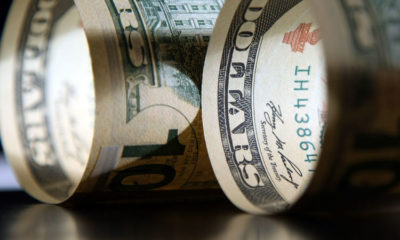The Naira depreciated against the US Dollar at both the official and parallel foreign exchange market segments on Wednesday, October 30.
The Naira dropped 0.04 per cent in the Nigerian Autonomous Foreign Exchange Market (NAFEX) The local currency lost 72 Kobo to close at N1,631.17/$1 at the official window.
According to data obtained from FMDQ Securities Exchange compared to N1,630.45/$1 published in the preceding session on Tuesday.
This happened as supply decreased at the FX market as secondary data showed that $128.98 million worth of turnover was recorded compared to the preceding session which $242.59 million was settled. This indicated a $113.61 million or 46.9 per cent slump.
In the black market, the Naira lost N4.08 against the greenback to close at N1,718.43 to the US Dollar compared to N1,714.35/$1 it closed on Thursday.
Meanwhile, the local currency appreciated against the Pound Sterling and the Euro in the midweek session for the week. For the British currency, the local currency appreciated by N18.57 and closed at N2,143.40/£1 from N2,161.97/£1 while it closed at the rate of N1,782.07/€1, a jump of N18.90 against N1,800.97/€1 against the Euro.
In a different outcome in the black market, the domestic currency headed south against the British currency during the midweek session as the Naira made a depreciation of N9.38 to wrap the session at N2,234.62/£1 from N2,225.24/£1 that it sold at the previous session
However, the Naira followed a different pattern against the Euro as it appreciated N15.38 to quote at N1,854.56/€1 versus the previous day’s rate of N1,856.79/€1.
The local currency dropped N2.31 to close at N1,235.70 per Canadian Dollar, compared to Tuesday’s N1,233.56 per CAD.
The supply challenge in the FX market comes as the Central Bank of Nigeria (CBN) continues to filter sales into the market alongside recommendations from the World Bank.
The US-headquartered bank in its latest report noted that permitting market participants to trade FX with more flexibility across time would also contribute to deepening the FX market, adding that the CBN should continue efforts towards deepening the official FX market.
This includes facilitating formal remittance inflows, allowing international oil companies to fully concentrate their FX sales in the official market, restoring intermediated market access to bureaux de change, and refraining from ad-hoc FX auctions.
“Allowing market participants to trade FX with more flexibility across time would also contribute to deepening the FX market,” the October report said.

 News4 weeks ago
News4 weeks ago
 Technology4 weeks ago
Technology4 weeks ago
 Business4 weeks ago
Business4 weeks ago
 Investment4 weeks ago
Investment4 weeks ago
 Banking Sector4 weeks ago
Banking Sector4 weeks ago
 Banking Sector4 weeks ago
Banking Sector4 weeks ago
 Investment4 weeks ago
Investment4 weeks ago
 Appointments4 weeks ago
Appointments4 weeks ago























